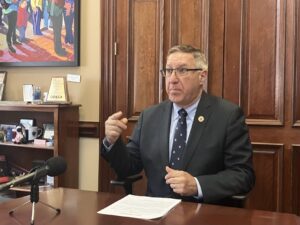
Senate Ways and Means Chair Michael Rodrigues speaks during a briefing on the surtax supplemental budget on Thursday, May 1, 2025. Photo by Alison Kuznitz | State House News Service
Senate Democrats want to send $370 million to the MBTA under a new spending plan fueled by excess surtax revenues, about $420 million less than the House approved across workforce, infrastructure and reduced fare investments at the beleaguered transit agency.
The Senate Ways and Means Committee approved a $1.28 billion supplemental budget (S 2512) Thursday that looks to steer $613 million to education and $670 million to transportation investments. Ways and Means Chair Michael Rodrigues said the branch attempted to achieve a mostly even split across the two funding categories allowed for surtax revenues, which are collected from households with annual incomes above about $1 million.
“It is always our goal, but we do not count down to the pennies, to try to equally invest the money in both education and transportation,” Rodrigues told reporters at a briefing Thursday morning.
The constitutional amendment voters approved in 2022 to authorize the surtax specified that resulting revenue could only be spent on transportation and education, but didn’t mandate how the funds would be divided.
The full Senate will debate the spending bill next Thursday, with amendments due by Monday afternoon.
The House passed its surtax-backed supplemental budget (H 4010) on April 9 on a 140-14 vote.
The House allocated $353 million for education and $828 million for transportation investments. The bill steered around $793 million to the MBTA, which faces a major gap between expected spending and revenues.
MBTA budget-writers are trying to hold on to service gains they’ve made by hiring and investing, but forecast they will need a significant increase in state aid to balance the agency’s fiscal year 2026 spending plan.
The preliminary budget plan T overseers advanced last week calls for pulling $86 million from a deficiency fund — which was drained last year and would be replenished by the surtax spending plan — plus leaning on more than $150 million proposed in the governor’s version of the surtax bill.
Even then, that combination of extra dollars would still leave the T with an $82 million shortfall the agency would need to close by curbing some of its own spending on things like overtime and professional services.
The MBTA under the Senate Ways and Means proposal would receive $200 million for its savings account, $100 million for workforce and safety training, $50 million for commuter rail system maintenance and upgrades, and $20 million for reduced fares for low-income riders.
The House bill’s MBTA investments included $400 million for workforce and safety investments, $300 million for the agency’s savings account, $60 million for “physical infrastructure,” $20 million for reduced fares and $13 million for Sumner Tunnel reimbursements.
Rodrigues said rising special education costs factored into the bill’s proposed spending split.
“There are some serious concerns, especially from our local school districts, around SPED, special education cost increases, and about the need to provide the ability for increased career technical initiative programs, both at our vocation schools and our comprehensive high schools,” Rodrigues said. “So we thought this was a very good split.”
Massachusetts relies on between $2 billion and $5 billion in federal education aid, Spilka told Springfield business leaders Wednesday. The money supports special education, school meals and transportation.
Rodrigues said his committee’s fiscal 2026 budget plan would also maintain a roughly event split between transportation and education investments.
Beyond the MBTA, Senate Democrats want to invest $190 million into “regionally equitable shovel-ready transportation improvements,” with nearly $165 million of that aimed at Chapter 90 supplemental funding, according to a fact sheet.
There’s also $105 million targeted for regional transit initiatives. That figure includes $50 million for capital improvements, $25 million for workforce recruitment and retention efforts at RTAs, $20 million for ferry infrastructure improvements, and $10 million for “on-demand micro-transit shuttles and Last Mile grants.”
Another $5 million would be funneled into “transportation improvements” surrounding the 2026 World Cup, with seven matches planned at Gillette Stadium in Foxborough. Rodrigues called the money a “down payment” for “traffic safety concerns.”
“It’s pretty wide open because we don’t know,” Rodrigues said when asked whether that money is only earmarked for the MBTA and commuter rail.
“I have not seen any, and I don’t even know if they’ve begun planning, what state they are to begin planning for this,” Rodrigues continued. “But I know Sen. Feeney, who represents Foxborough, who actually lives within earshot of the stadium, has expressed concerns because he witnesses what happens for every Patriots game, or for every concert, that’s at Gillette Stadium. This is going to be Patriots games on steroids. I’m excited about it, too.”






